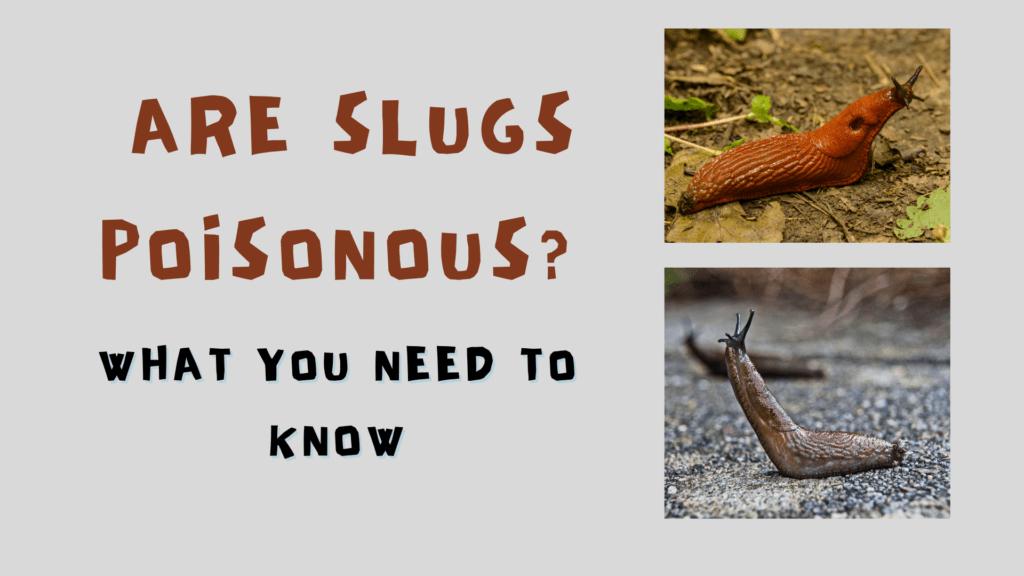
Slugs are slimy, slow-moving creatures often spotted in gardens, under rocks, and during rainy weather. While they might look harmless—or even a little gross—many people wonder:
Are slugs poisonous to humans, pets, or other animals?
The short answer is no, slugs are not poisonous, but there are important health risks associated with them. Let’s explore the facts in detail.
Are Slugs Poisonous?
Slugs themselves are not poisonous. They do not have venom, poison glands, or stingers. You can touch a slug with your bare hands without being harmed. However, some species can carry harmful parasites or bacteria that pose a risk—especially if slugs are accidentally ingested by humans or animals.
Health Risks Linked to Slugs
While slugs aren’t poisonous, they can still cause problems in certain situations:
1. Rat Lungworm Disease (Angiostrongyliasis)
Some slugs, especially in warm and tropical regions, carry the parasite Angiostrongylus cantonensis, known as rat lungworm. This parasite can cause a rare form of meningitis in humans if ingested.
How humans get it: Eating raw or undercooked vegetables contaminated by slug slime or accidentally swallowing a tiny slug or snail.
Symptoms: Headache, neck stiffness, nausea, nerve pain, and in rare cases, serious neurological complications.
2. Food Contamination
Slug trails may carry bacteria like E. coli or Salmonella, which can contaminate produce in gardens. Eating unwashed veggies from the garden can lead to foodborne illness.
3. Pet Safety
Dogs and cats might be tempted to eat slugs or lick them. While slugs aren’t toxic on their own, pets can also be exposed to rat lungworm or develop vomiting, diarrhea, or excessive drooling due to irritation or bacteria in the slug’s slime.
Also read:
Silverfish vs Centipede – Who’s the Real Nightmare?
How to Stay Safe Around Slugs
To minimize health risks associated with slugs:
Wash Your Hands: Always wash your hands after handling slugs or gardening.
Wash Fruits and Vegetables: Thoroughly rinse produce before eating, especially if you grow your own.
Supervise Pets: Prevent pets from eating slugs or licking areas where slugs have been.
Avoid Eating Slugs: Never consume raw or undercooked slugs.
Also read:
Powderpost Beetles: How to Spot the Damage Early!
Drywood Termites: How to Spot, Treat, and Prevent Them!
Slugs vs. Slug Slime: Is the Mucus Dangerous?
Slug slime (mucus) is not toxic, but it can be sticky, irritating, and unsanitary. It contains proteins and bacteria that may cause skin irritation in some people—especially if left on the skin too long.
If you touch slug slime:
Wash your hands thoroughly with soap and water.
Avoid touching your eyes, mouth, or face before washing up.
How to Keep Pets Safe from Slugs
To protect your pets from slugs and potential health risks:
- Don’t let pets eat slugs or snails.
- Watch for signs of illness after outdoor play, especially in damp areas.
- Use pet-safe slug repellents or barriers in your garden.
- Avoid using slug pellets or baits with metaldehyde, which are toxic to pets.
Final words
Slugs are not poisonous in the traditional sense, but they can carry harmful parasites and bacteria. By practicing good hygiene and following simple precautions, you can enjoy your garden and stay safe from slug-related health risks.
Water Bugs: The Shocking Truth You Didn’t Know !
FAQ’s:
1. Are slugs harmful to plants?
Yes, slugs can be harmful to plants. They feed on leaves, stems, and roots, causing significant damage to garden plants.
2. Do slugs have a venomous bite?
No, slugs do not bite or have venom. They use a slimy mucus trail to move and feed.
3. Can slugs transmit diseases to humans?
Slugs can carry diseases like rat lungworm, which may pose a risk to humans if consumed accidentally or through contact with contaminated surfaces.
4. Are garden slugs safe to handle?
Garden slugs are generally safe to handle. However, it’s best to wash your hands afterward to avoid any bacteria or parasites they may carry.
5. Can slugs poison my fish tank?
While slugs are not directly poisonous to fish, their presence in a fish tank can cause problems, like contamination from their slime or if they die and decompose.
6. What should I do if my pet eats a slug?
If your pet eats a slug, monitor them for signs of illness. If you’re concerned, contact a vet, as slugs may carry parasites like lungworm.
7. How can I prevent slugs from entering my home?
To prevent slugs from entering your home, seal cracks and gaps, remove food sources, and place barriers like salt or copper tape around entry points.

